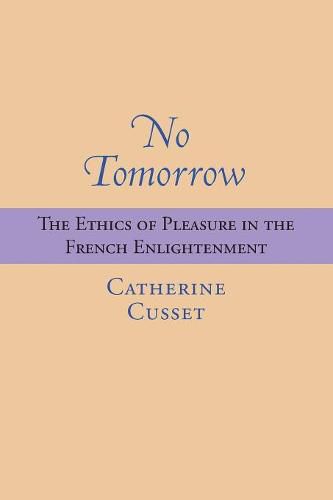Readings Newsletter
Become a Readings Member to make your shopping experience even easier.
Sign in or sign up for free!
You’re not far away from qualifying for FREE standard shipping within Australia
You’ve qualified for FREE standard shipping within Australia
The cart is loading…






This title is printed to order. This book may have been self-published. If so, we cannot guarantee the quality of the content. In the main most books will have gone through the editing process however some may not. We therefore suggest that you be aware of this before ordering this book. If in doubt check either the author or publisher’s details as we are unable to accept any returns unless they are faulty. Please contact us if you have any questions.
Winner of the 1996 Walker Cowen Memorial Prize, Catherine Cusset’s No Tomorrow traces the moral meaning of pleasure in several libertine works of the eighteenth-century-Watteau’s Pelerinage a l'ile de Cythere, Prevost’s Manon Lescaut, Crebillon’s Les egarements du coeur et de l'esprit, the anonymous pornographic novel Therese philosophe, Diderot’s La religieuse, and Vivant Denon’s short story
Point de lendemain.
In this ambitious book, Cusset reframes the often misunderstood genre that celebrates what Casanova calls
the present enjoyment of the senses.
She contends libertine works are not, as is commonly thought, characterized by the preaching of sexual pleasure but are instead linked by an
ethics of pleasure
that teaches readers that vanity and sensual enjoyment are part of their moral being. Developing Roland Barthes’s concept of
the pleasure of the text,
the author argues that the novel is a powerful vehicle for moral lessons, more so than philosophical or moral treatises, because it conveys such lessons through pleasure.
Cusset reads the proliferation of libertine novels as a reaction against the denial of pleasure in the literature and culture of the time. In the midst of the century’s metaphysical impulse to simplify human psychology, these works focus on the moments in which human contradictions are revealed.
Cusset’s analysis suggests that libertine novels offered the eighteenth century a more complex picture of moral being and ultimately contributed a lesson of tolerance to the Enlightenment.
$9.00 standard shipping within Australia
FREE standard shipping within Australia for orders over $100.00
Express & International shipping calculated at checkout
This title is printed to order. This book may have been self-published. If so, we cannot guarantee the quality of the content. In the main most books will have gone through the editing process however some may not. We therefore suggest that you be aware of this before ordering this book. If in doubt check either the author or publisher’s details as we are unable to accept any returns unless they are faulty. Please contact us if you have any questions.
Winner of the 1996 Walker Cowen Memorial Prize, Catherine Cusset’s No Tomorrow traces the moral meaning of pleasure in several libertine works of the eighteenth-century-Watteau’s Pelerinage a l'ile de Cythere, Prevost’s Manon Lescaut, Crebillon’s Les egarements du coeur et de l'esprit, the anonymous pornographic novel Therese philosophe, Diderot’s La religieuse, and Vivant Denon’s short story
Point de lendemain.
In this ambitious book, Cusset reframes the often misunderstood genre that celebrates what Casanova calls
the present enjoyment of the senses.
She contends libertine works are not, as is commonly thought, characterized by the preaching of sexual pleasure but are instead linked by an
ethics of pleasure
that teaches readers that vanity and sensual enjoyment are part of their moral being. Developing Roland Barthes’s concept of
the pleasure of the text,
the author argues that the novel is a powerful vehicle for moral lessons, more so than philosophical or moral treatises, because it conveys such lessons through pleasure.
Cusset reads the proliferation of libertine novels as a reaction against the denial of pleasure in the literature and culture of the time. In the midst of the century’s metaphysical impulse to simplify human psychology, these works focus on the moments in which human contradictions are revealed.
Cusset’s analysis suggests that libertine novels offered the eighteenth century a more complex picture of moral being and ultimately contributed a lesson of tolerance to the Enlightenment.